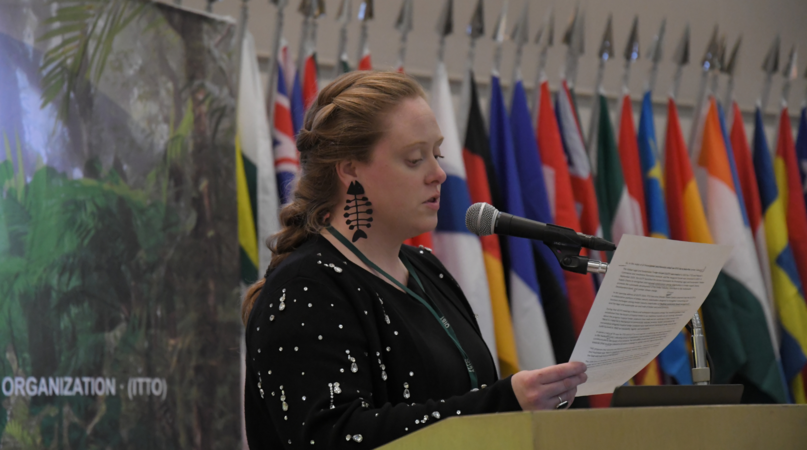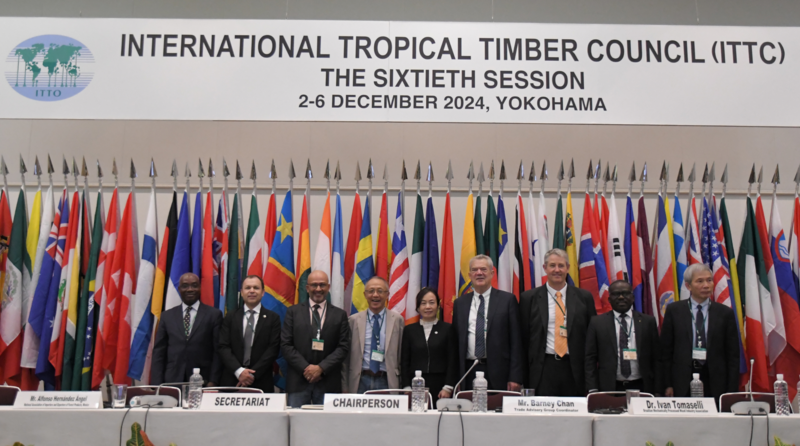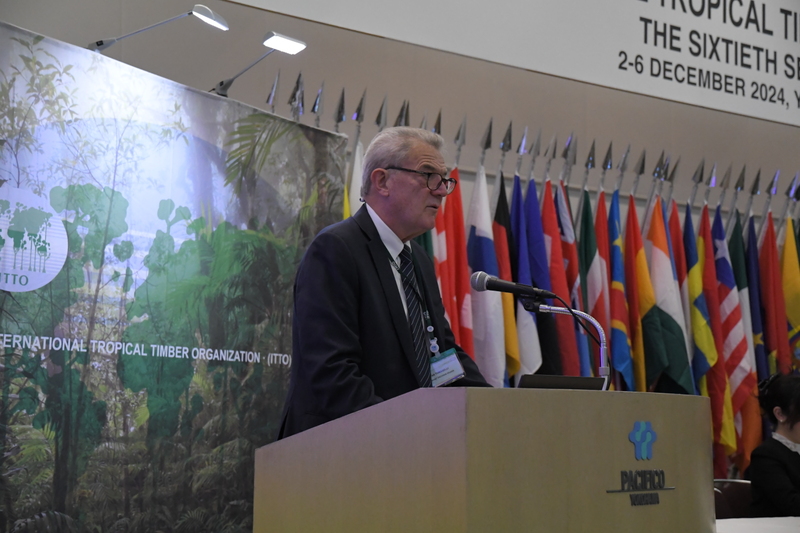Tropical timber trade group wants ITTO to do more to champion tropical timber
3 December 2024, Yokohama

Ms Ashley Amidon, International Wood Products Association, USA, reads the statement prepared by the Trade Advisory Group (TAG). Photo: P.Sarigumba/ITTO
With wood producers worldwide reeling from skyrocketing shipping costs and the tropical timber sector suffering from negative consumer perceptions, the Trade Advisory Group (TAG) called on ITTO today to focus on rebuilding demand for tropical timber by communicating the “tremendous progress” producers have made on timber traceability, legality and sustainability.
In a statement delivered as part of Trade and Markets Day during the 60th session of the International Tropical Timber Council, TAG said the tropical timber sector was under pressure on various fronts, especially from shipping costs.
“Exporters in many producer countries are not happy that shipping companies are using the continuing fallout from the Covid pandemic and geopolitical conflicts as reasons to increase marine freight and other logistics costs,” TAG said in its statement.
Shipping costs increased ten-fold immediately after the pandemic and were still five times higher than they were pre-Covid, according to the TAG statement, with shippers blaming the war in Ukraine and difficulties in the Red Sea.
“Ultimately, these costs will not only depress trade but be passed along to the consumer, at a time when price consciousness is an increasing barrier to the use of wood,” said TAG.
Compounding this problem, according to TAG, is the lack of information in traditional markets on the progress tropical timber producers are making towards sustainable forest management.
The TAG statement referred to the Global Legal and Sustainable Timber Forum (GLSTF), which was created in 2023 by ITTO and the Macao Commerce and Investment Promotion Institute (IPIM). This year, the GLSTF launched the Action Framework for Promoting Legal and Sustainable Timber Supply Chains with the aim of strengthening international collaboration among stakeholders in timber supply chains, promoting the sustainable development of the timber industry, contributing to the Sustainable Development Goals, and combating climate change.
“It seems a natural fit now for ITTO and GLSTF to work together on addressing the negative perceptions in the market,” said TAG in the statement.
“Together, we can create a narrative that demonstrates what we all know—that wood is sustainable, that trade benefits forests, and that together, we can protect tropical forests for the future.”
Trade and Markets Day heard from six speakers on the theme, “production and trade: rising costs and weakening demand”

Ivan Tomaselli, from STCP in Brazil, posed the question, “Has ITTO failed in fulfilling its objective to promote the sustainable management and legal harvesting of tropical forests and the expansion and diversification of international trade in tropical wood products?” He concluded that, in one sense, ITTO is not failing because great progress had been made in the sustainable management of tropical forests, and sustainability now guides the actions of the tropical timber sector. In another sense, however, it is failing because tropical timber is losing market share. Dr Tomaselli proposed focusing more on plantations and improving communication on the progress being made towards sustainability.
Jean Marie Ntoutoume, from l’Union des Forestiers et Industriels du Bois in Gabon, outlined the history of forest production in Gabon, which is a major earner of foreign exchange and accounts for about 17 000 direct and indirect jobs in the country’s private sector. Following a log-export ban in 2021, all logs are processed locally, but the country needs to increase its competitiveness by reducing production costs and order response times.
Alfonso Hernàndez Ángel, from the National Association of Importers and Exporters of Forest Products in Mexico, said almost 12 million people in his country live in or are dependent on forest ecosystems. Deforestation is a serious problem, caused mainly by conversion for livestock grazing, annual crop production, and infrastructure and real estate development. He called for more forest education and investment in the forest sector, and avoidance of over-regulation.
Ngo Sy Hoai, from the Viet Nam Timber and Forest Product Association, provided data illustrating the success of the forest sector and wood-processing industries and outlined the policy settings that have enabled this. He said acacia is crucial for the sector, providing 80% of raw materials; smallholders supply 70–80% of the acacia logs used by the sector. Mr Ngo referred to several challenges and called on ITTO to, among other things, advocate for fair trade and the development of a sustainable wood industry.
Braden Jenkin, from Sylva Systems Australia, talked about the use of timber obtained from plantation-grown trees and the differences in wood properties between these and the same species grown in natural forests. The differences require a “mind re-set” so that product and market development is based on the characteristics of the new raw material. Plantations offer an opportunity to produce new products, both in their own right and in combination with natural-forest-sourced wood.
Luo XinJian provided an overview of the Global Green Supply Chains Initiative, an international platform for advancing timber industry sustainability. She also spoke about the Global Legal & Sustainable Timber Forum held in China, Macau SAR, in 2024 and some of the achievements reported there, including implementation of the Global Timber Index Platform and collaboration on Central Africa–China timber industrial clusters and parks.

The presentations made during Trade and Markets Day are available here: https://www.itto.int/ittc-60/presentations.
Daily coverage of the session by IISD reporting services is available at https://enb.iisd.org/ittc60-international-tropical-timber-council.